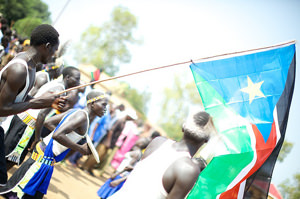South Sudan Becomes a Nation
After more than five decades of civil war that have seen millions displaced and killed, South Sudan seceded from the Arab-dominated north Saturday to become Africa's newest nation. (more)
After more than five decades of civil war that have seen millions displaced and killed, South Sudan seceded from the Arab-dominated north Saturday to become Africa’s newest nation. The country’s president, Salva Kiir, wore his signature black cowboy hat — a gift from George W. Bush — while he signed the interim constitution before cheering crowds.
The struggle for peace is far from over, however. Relations with the north remain tense and the country’s leaders have to decide how to manage its oil supplies. They will have to do so while contending with rebels who want control of the region, some of whom threaten to renew the north-south conflict as they continue fighting in the borderlands, analysts say. –ARK
Your support matters…The New York Times:
A new nation was being born in what used to be a forlorn, war-racked patch of Africa, and to many it seemed nothing short of miraculous. After more than five decades of an underdog, guerrilla struggle and two million lives lost, the Republic of South Sudan, Africa’s 54th state, was about to declare its independence in front of a who’s who of Africa, including the president of the country letting it go: Omar Hassan al-Bashir of Sudan, a war-crimes suspect.
… “This is a beautiful day for Africa,” said Joseph Deiss, president of the United Nations General Assembly. “This is a remarkable achievement, a longstanding conflict has been stopped.”
Perhaps. But South Sudan — Texas-size and with about eight million people — is already plagued by ethnic tensions and rebellions. More than a half-dozen renegade groups are battling the government, some with thousands of fighters. And relations with the north are still dicey. Negotiators have yet to agree on a formula to split the revenue from the south’s oilfields, which have kept the economies of both southern and northern Sudan afloat. And Mr. Bashir’s army has been pounding southern-allied rebels who have [been] refusing to disarm just north of the border in the Nuba Mountains, which some analysts worry could drag the whole region back into a full-scale war.
Independent journalism is under threat and overshadowed by heavily funded mainstream media.
You can help level the playing field. Become a member.
Your tax-deductible contribution keeps us digging beneath the headlines to give you thought-provoking, investigative reporting and analysis that unearths what's really happening- without compromise.
Give today to support our courageous, independent journalists.






You need to be a supporter to comment.
There are currently no responses to this article.
Be the first to respond.